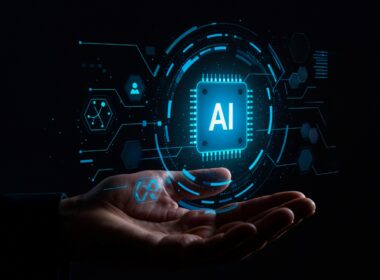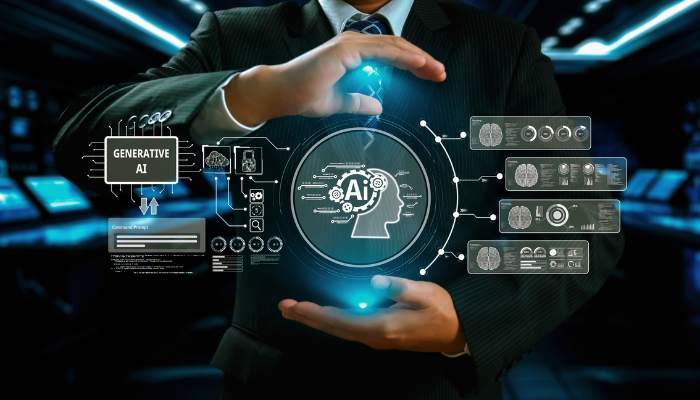Efficiency is the need of the hour in today’s business environment. Founders, CTOs, and product heads alike are constantly looking for ways to optimize their business operations and get the most out of their resources. Hence, AI has been introduced to business operations to increase their efficiency.
AI has the potential to reduce human resources’ manual workload and reduce errors. Due to this ability, it’s slowly being integrated into every aspect of a business. One such area is auditing. Combining AI and auditing can speed up the process while adding accuracy, transparency, and cost savings to an auditor’s work.
This is the promise of using AI in auditing, and it’s more accessible than you think. With the right tools and expertise, you can use AI to streamline operations, improve decision-making, and keep your business ahead of the curve.
For a better understanding of the benefits, we must take a closer look at how utilizing AI in the auditing process can help your business.
Benefits of Using AI in Auditing
Thanks to AI, auditing has become not just faster but also smarter. There’s no need to go through piles of paperwork and manual data analysis as AI and auditing save time, improve accuracy, and boost efficiency. Let’s see how:
- First, AI can handle tasks like journal entry testing which is one of the more tedious parts of auditing. You have to check and verify multiple transactions. But AI automates this process and eliminates human error. The AI algorithms can quickly flag suspicious entries or anomalies.
- AI can identify risks at a deeper level. Traditionally, audits rely on sampling, where only a portion of the data is reviewed which leaves room for errors. With AI, auditors can review every single transaction in the dataset. This leads to higher audit quality and more reliable insights.
- Lastly, AI can process large datasets in a fraction of the time a human takes to do the same. This speed not only increases efficiency but also allows you to perform more frequent audits. Your business can always stay on top of its compliance and performance metrics.
If you want to unlock the power of AI in your auditing processes, Codewave’s Process Automation services let you streamline operations, enhance accuracy, and drive efficiency. Our team specializes in leveraging AI to optimize auditing and integrating intelligent automation into your workflows.
It’s clear that AI is transforming the way businesses approach auditing. With clear benefits that can improve how you manage your company’s financial health, AI and auditing can help businesses of all shapes and sizes.
Now, how does AI help with the planning and execution of an audit? Thanks to AI, audit plans are crafted with precision and your audits are executed with efficiency. However, we must take a closer look at the usage of AI in the auditing process.
Using AI to Enhance Audit Planning and Execution
1. Enhanced Data Collection and Integration
AI allows auditors to gather data from a wide range of sources, including financial records, emails, contracts, and even social media, and integrate it into a cohesive analysis. Unlike traditional methods, which often rely on sample data, AI tools can process and review 100% of the available data, ensuring that every transaction, document, and record is accounted for. This comprehensive data collection minimizes the risk of overlooking critical information.
For example, AI-powered systems can automatically extract relevant information from financial reports or invoices using techniques like Optical Character Recognition (OCR) and Natural Language Processing (NLP). This speeds up the audit process and improves accuracy by ensuring no detail is missed.
2. Improved Anomaly Detection
One of the most significant contributions of AI in auditing is its ability to detect anomalies. Traditional audits often rely on periodic reviews and manual inspection, which may overlook subtle discrepancies. AI can continuously monitor transactions in real time and flag unusual patterns, transactions, or behaviors that might indicate fraud or compliance risks.
Machine learning algorithms can recognize patterns and deviations that would be invisible to human auditors. For instance, an AI system might detect unusual expense claims that fall outside typical spending behavior for a specific department, or identify irregularities in transaction volumes between related parties.
3. Predictive Analytics for Risk Assessment
AI enhances risk assessment by using predictive analytics to forecast potential issues based on historical data. By analyzing past audit results, market trends, and even external factors like economic indicators, AI can predict where errors, fraud, or compliance issues are likely to occur in the future.
This predictive capability allows auditors to be more proactive, focusing their attention on high-risk areas before problems escalate. For example, an AI tool might analyze data trends over several quarters to identify departments or processes that consistently produce higher levels of risk, allowing auditors to prioritize those areas in their review.
4. Automating Routine Tasks
Routine tasks like data reconciliation, transaction verification, and compliance checks can be automated using AI. This frees up auditors to focus on higher-level analysis and decision-making. The automation of these tasks also reduces the chance of human error, increasing the accuracy and reliability of audit results.
For example, instead of manually comparing thousands of transactions between two systems, AI can automatically reconcile data, ensuring that any discrepancies are identified and addressed immediately. This level of automation leads to more efficient audit processes and quicker resolution of issues.
5. Real-Time Reporting and Continuous Auditing
With AI, the days of waiting for the end of a financial period to begin auditing are over. AI allows for real-time reporting and continuous auditing, meaning auditors can monitor financial data as it flows through the system. This immediate access to real-time data enhances decision-making and allows businesses to catch errors or irregularities as they happen.
Real-time reporting is particularly beneficial for industries with high volumes of transactions or where regulations require constant monitoring. For example, in the banking sector, AI-driven continuous auditing can help institutions comply with regulatory requirements by continuously monitoring transactions and generating reports on demand.
6. Generating Advanced Insights and Recommendations
AI can not only highlight issues but also provide actionable insights and recommendations for auditors. By analyzing large datasets and identifying complex patterns, AI tools can suggest improvements to processes, highlight inefficiencies, and recommend changes that could mitigate risk or enhance compliance.
For example, after analyzing an organization’s expense reporting system, an AI tool might recommend tightening approval workflows or revising policies that allow for excessive discretionary spending. These insights enable auditors to deliver more strategic advice, helping businesses improve their overall financial health and operational efficiency.
Say goodbye to manual auditing mistakes! Our team at Codewave can assist you in adopting AI solutions that enhance accuracy through better data analysis. Discover how we can help you implement AI for improved auditing through real-time data analysis for early risk identification.
So, what we understand is when it comes to auditing; accuracy and insights are key. But how exactly does AI improve audit quality for better insights?
Improving Audit Quality and Insights Through AI
AI can truly transform how your business operates by improving audit quality and delivering deeper insights. Here’s a look at ways through which you can get better quality audits and insights into your business operations using AI.
- Continuous Financial Monitoring
Instead of waiting for year-end audits, AI can review your financial data in real-time. It tracks every transaction as it happens. This ongoing review process means you’re always up to date with your business’s financial health. Plus, AI evolves with your business and adapts to new data to improve its accuracy over time.
- Detecting Frauds
Another area where AI shines is in fraud detection and compliance checks. AI systems are designed to pick up on even the smallest anomalies in data. It can be identifying unusual transactions or spotting patterns that might indicate fraudulent activity.
Plus, AI even checks that your business complies with ever-changing legal and regulatory standards.
- Data-Driven Insights
AI brings the power of predictive models into your audits. AI can help your auditors identify trends and forecast potential risks before they become real problems. They do so by analyzing large sets of historical data.
These predictive models offer insights into future risks, opportunities for optimization, and areas of improvement, to improve your audit reports. In a way, your audits become tools for forward-looking and strategic decision-making.
Are you ready to evolve your auditing practices? Codewave offers comprehensive AI audit solutions to help you integrate AI seamlessly into your business processes. Find out how we can support your journey towards more effective audits.
Integrating AI and auditing into your processes helps you ensure that your audits not only meet today’s standards but also evolve to anticipate tomorrow’s challenges. But as promising AI is for auditing, it does not come without a set of challenges and hurdles. Let’s take a closer look at these challenges and why they matter for your business.
Challenges and Considerations in AI Adoption
While there are challenges in adopting AI and auditing that you must face, it does not mean they can’t be minimized or prevented. Here’s how you can face such challenges.
- Some sectors have embraced AI faster than others, such as finance and healthcare are already leveraging AI for audits. But, smaller companies or those in traditional industries might be slower to adopt due to costs, lack of awareness, or reluctance to change established practices.
- Geographical differences also become a hurdle, as regulatory environments and infrastructure can change widely between countries. This inconsistency can hinder smooth adoption for businesses expanding across borders or operating in multiple regions.
- Another critical issue is addressing algorithmic bias and ensuring transparency. As discussed, if AI systems are not properly designed and managed, they can make biased decisions or overlook critical data points. Businesses can counter this by checking that their AI systems are built on diverse data and regularly reviewed.
- AI systems thrive on data, so they’re only as good as the data they are given. Poor-quality data can lead to inaccurate audit results. There’s also the issue of cybersecurity as businesses rely more on digital data and AI tools.
While AI offers immense potential for improving auditing processes, these challenges highlight the need for thoughtful adoption. You must understand that just adopting the technology doesn’t get the job done. Instead, a well-planned strategy led by strong leadership, clear direction, and a commitment to responsible use is the key.
Strategically Integrating and Adopting AI
When implemented thoughtfully, AI can transform your processes, making them faster, more accurate, and more insightful. However, the foundation for this transformation is strategic integration.
Here are ways you can thoughtfully integrate AI and auditing into your business operations.
- Importance of Strong Leadership
Without strong guidance from the top, AI adoption can falter. CEOs, CTOs, and other key decision-makers should have a clear understanding of its potential benefits and limitations. This enables them to guide the organization through the change and ensure the right resources, talent, and tools are in place.
- Create Company-Wide AI Strategy
If AI integration is seen as an IT project rather than a company-wide initiative, its adoption will likely be fragmented and less effective. This isn’t something that can be left to the IT department alone.
- A company-wide AI strategy should involve the entire organization, including board members. Involving board members is also important as it ensures that AI aligns with the company’s long-term goals and risk management strategies.
- From operations to compliance, every part of the business should be involved. Each department must also understand how AI will impact their work.
- Ethical AI Usage
Businesses must focus on using AI ethically to maximize its benefits and minimize potential risks.
- AI systems must be transparent and free from bias to ensure fairness in decision-making.
- Your customers, employees, and partners need to trust that the AI tools you implement are used responsibly, whether it’s detecting fraud or analyzing financial data.
- Regular reviews of the AI models, making sure they follow ethical guidelines, and ensuring that the process is analyzed by humans are key parts of the process.
Conclusion
AI is reshaping the auditing world, making it more efficient and accurate than ever before. As AI technology advances, it allows auditors to focus on insights and strategic decisions while automating the heavy lifting.
For businesses wanting to stay ahead, adopting AI in auditing is now essential. At Codewave, with over a decade of experience and 400+ successful projects delivered worldwide, we specialize in design-led tech solutions that make AI integration seamless.
Our team works closely with you to understand your unique needs, implementing AI-driven processes that boost accuracy, streamline audits, and improve overall performance.
Ready to elevate your auditing process? Contact Codewave today to see how we can help you seamlessly integrate AI into your operations for maximum efficiency and growth.
Codewave is a UX first design thinking & digital transformation services company, designing & engineering innovative mobile apps, cloud, & edge solutions.







